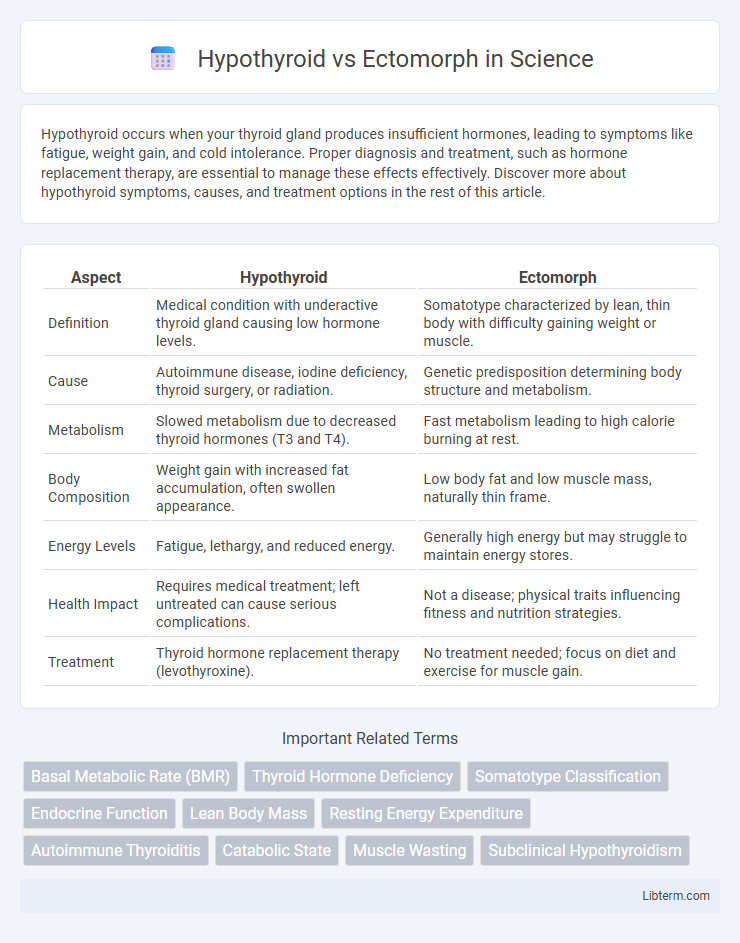Hypothyroid occurs when your thyroid gland produces insufficient hormones, leading to symptoms like fatigue, weight gain, and cold intolerance. Proper diagnosis and treatment, such as hormone replacement therapy, are essential to manage these effects effectively. Discover more about hypothyroid symptoms, causes, and treatment options in the rest of this article.
Table of Comparison
| Aspect | Hypothyroid | Ectomorph |
|---|---|---|
| Definition | Medical condition with underactive thyroid gland causing low hormone levels. | Somatotype characterized by lean, thin body with difficulty gaining weight or muscle. |
| Cause | Autoimmune disease, iodine deficiency, thyroid surgery, or radiation. | Genetic predisposition determining body structure and metabolism. |
| Metabolism | Slowed metabolism due to decreased thyroid hormones (T3 and T4). | Fast metabolism leading to high calorie burning at rest. |
| Body Composition | Weight gain with increased fat accumulation, often swollen appearance. | Low body fat and low muscle mass, naturally thin frame. |
| Energy Levels | Fatigue, lethargy, and reduced energy. | Generally high energy but may struggle to maintain energy stores. |
| Health Impact | Requires medical treatment; left untreated can cause serious complications. | Not a disease; physical traits influencing fitness and nutrition strategies. |
| Treatment | Thyroid hormone replacement therapy (levothyroxine). | No treatment needed; focus on diet and exercise for muscle gain. |
Understanding Hypothyroidism: Causes and Symptoms
Hypothyroidism, a condition caused by insufficient thyroid hormone production, leads to metabolic slowdown and symptoms such as fatigue, weight gain, and cold intolerance. Unlike an ectomorph body type characterized by a naturally fast metabolism and lean physique, hypothyroidism disrupts normal metabolic functions, often causing difficulty in maintaining weight. Understanding the hormonal imbalance and typical clinical manifestations is crucial for distinguishing hypothyroidism from natural body composition variations like those seen in ectomorphs.
Who is an Ectomorph? Traits and Characteristics
An ectomorph is a body type characterized by a lean, slender frame, narrow shoulders, and low body fat, often making weight gain difficult despite high caloric intake. Traits include a fast metabolism, long limbs, and a delicate bone structure, which distinguishes ectomorphs from other somatotypes. Unlike hypothyroid individuals who may experience slowed metabolism and weight gain, ectomorphs typically struggle with maintaining or increasing muscle mass due to their naturally efficient metabolic rate.
Metabolism Differences: Hypothyroid vs. Ectomorph
Hypothyroidism significantly slows metabolism due to reduced thyroid hormone production, leading to decreased energy expenditure and weight gain. Ectomorphs naturally possess a fast metabolism characterized by high basal metabolic rates, making weight gain and muscle mass accumulation challenging. Understanding these metabolic distinctions is crucial for tailoring diet and exercise strategies effectively for individuals with hypothyroidism versus ectomorphic body types.
Body Composition and Weight Patterns
Hypothyroidism typically leads to slowed metabolism, causing increased fat accumulation and difficulty gaining muscle, resulting in weight gain and a higher body fat percentage despite low activity levels. In contrast, ectomorph body types naturally have fast metabolisms, characterized by lean muscle mass, low body fat, and difficulty gaining weight due to rapid calorie burning. Understanding these distinct metabolic and physiological differences is essential for tailoring nutrition and exercise strategies to optimize body composition effectively.
Energy Levels and Fatigue: Distinguishing Factors
Hypothyroidism often causes persistent fatigue and low energy levels due to reduced thyroid hormone production, which slows metabolism and impairs cellular energy. In contrast, ectomorph body types naturally exhibit higher metabolic rates and may experience fluctuating energy, but fatigue is typically linked to nutritional intake rather than hormonal imbalance. Assessing fatigue patterns, alongside thyroid function tests, helps differentiate hypothyroid fatigue from energy variations common in ectomorphs.
Nutritional Needs for Hypothyroidism and Ectomorphs
Hypothyroidism requires a nutrient-dense diet rich in iodine, selenium, and zinc to support thyroid function and metabolic rate, while ectomorphs benefit from high-calorie meals emphasizing complex carbohydrates and lean proteins to promote muscle gain and energy. Both conditions demand careful management of macronutrient balance, with hypothyroid individuals needing adequate antioxidants to combat oxidative stress, and ectomorphs focusing on frequent nutrient-rich snacks to maintain steady energy levels. Tailoring micronutrient intake, such as incorporating foods high in vitamin D and B vitamins for thyroid health, complements ectomorph nutritional strategies aimed at optimizing metabolic efficiency and body composition.
Exercise Recommendations: What Works Best
Hypothyroid individuals often benefit from low-impact, moderate-intensity exercises such as walking, swimming, and yoga to support metabolism without overstraining the thyroid. Ectomorphs, characterized by a fast metabolism and lean build, respond well to strength training and high-intensity interval training (HIIT) to promote muscle growth and overall weight gain. Customizing exercise routines based on metabolic rate and body type optimizes energy use, muscle development, and hormonal balance.
Hormonal Influences on Body Type and Function
Hypothyroidism significantly reduces metabolic rate by decreasing thyroid hormone levels, leading to weight gain and decreased muscle mass, which contrasts sharply with the naturally high metabolism and lean physique typical of ectomorphs. Ectomorphs exhibit efficient thyroid function, supporting higher basal metabolic rates and lean muscle development, whereas hypothyroid individuals frequently experience muscle weakness and fat accumulation due to hormonal imbalance. Understanding these hormonal influences is critical for tailoring nutritional and fitness strategies to manage hypothyroid metabolism or optimize the ectomorphic body type.
Common Misconceptions and Overlapping Symptoms
Hypothyroidism and ectomorph body type are often confused due to overlapping symptoms such as difficulty gaining weight and low energy levels. A common misconception is that being an ectomorph automatically implies a thyroid disorder, while hypothyroidism is a medical condition characterized by an underactive thyroid gland affecting metabolism. Accurate diagnosis requires thyroid function tests, as ectomorph traits are genetic and do not involve hormonal imbalances.
Managing Health: Tailored Strategies for Each Condition
Managing hypothyroidism requires consistent thyroid hormone replacement therapy alongside a nutrient-rich diet emphasizing iodine, selenium, and zinc to support metabolic function. Ectomorphs benefit from a high-calorie, protein-dense diet combined with resistance training to promote muscle growth and prevent excessive weight loss. Both conditions demand personalized fitness plans and regular monitoring to optimize energy levels, metabolic health, and overall well-being.
Hypothyroid Infographic

 libterm.com
libterm.com